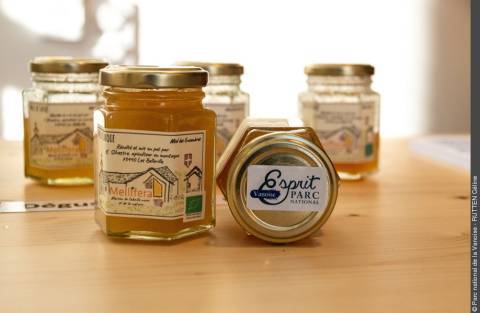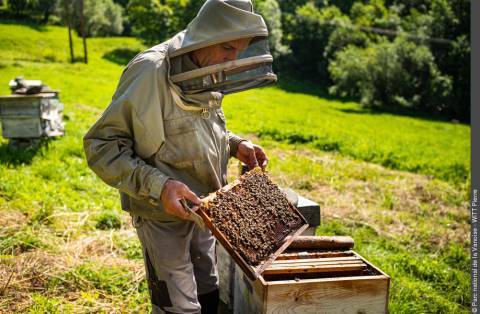
15 rue Saint-Jacques
52210 ARC-EN-BARROIS
France
A native of vallée des Bellevilleklébert Silvestre began his career as a shepherd of cows and goats, and is now a "bee shepherd" at Les Belleville. He is committed to the protection of these precious foragers, taking an active part in the actions led by the Conservatoire de l'abeille noire de la vallée des Encombres.
Beekeeping is a passion. My grandfathers already had black bees. Working with local bees and preserving the black bee makes sense, because it's the bee that's native to France and particularly to Savoie, with our local ecotype Apis mellifera mellifera.
It's a bee that's adapted to our territory, hardy and thrifty. It's also a bee for the long term, as it's one of the only bees that would be able to survive without man today. That's one of the reasons why we want to preserve it.
Today, I produce honey and I'm working hard to preserve the breed through breeding, for example, by dividing and swarming.
Why preserve the black bee? Because today it's endangered. Beekeeping being what it is today, with many hives being lost, beekeepers, especially on the plains, go abroad to buy new queens. So we end up losing the specificity of our local bees by fertilizing them in the wild.
In Savoie since 1997, we've had an association called CETA (Centre d'études de techniques apicoles) to preserve the black bee. We offer training courses for beekeepers and the general public. We're also part of FEDCAN, the European Federation of Black Bee Conservatories. And we have a partnership with Switzerland, which also has a local black bee.
I joined Esprit parc national because I knew the Parc national de la Vanoise well, and I'm also an elected official at Belleville town hall, so we work with the Parc national teams. I've worked on wetlands, the blue thistle and so on. The National Park has been with me since I was born in 1963. It's always been something I've appreciated, and I think it's great that we work together. It was a logical next step to have the brand for my business.
Working with the black bee also means promoting sustainable practices. It's a bee that requires less care. It's a sustainable bee with which you can do beekeeping that's a little more "sedentary" and less "intensive". It is truly adapted to its mountain biotope. It is capable of surviving more than 4 to 5 months in winter under the snow. It is resistant to the cold and winters in small populations, so needs fewer provisions.
For the future of the black bee, I hope that local and national beekeepers will be more aware of how lucky we are to have the black bee, and that we can work together to preserve it more effectively.



